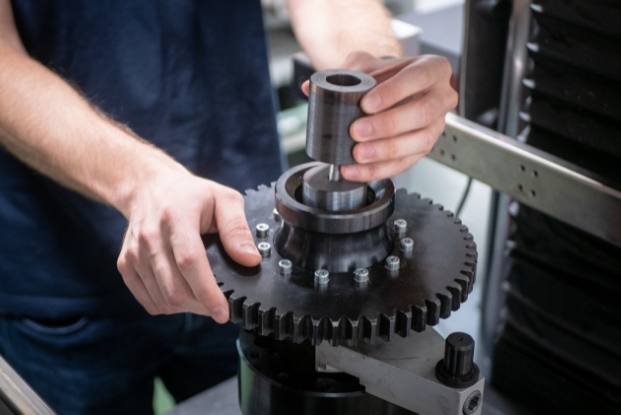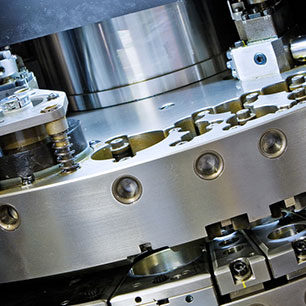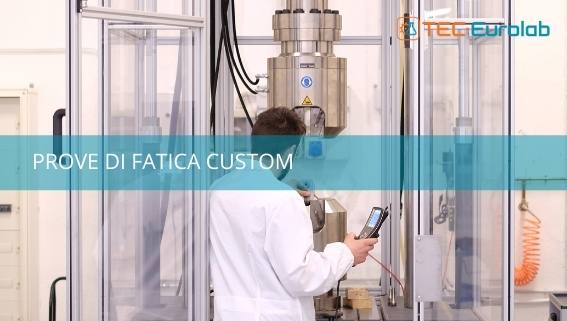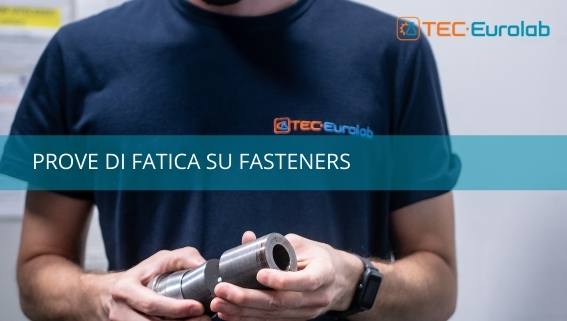fatigue tests
TEC Eurolab
Mechanical characterization of your material with fatigue testing
Check the dynamic mechanical performance of your materials both at low and high temperatures, as well as room temperature
If your product is made of materials subjected to varying stresses over time, you need this kind of testing. TEC Eurolab can identify material behavior by simulating actual operating conditions.

TEC Eurolab
FATIGUE STRENGTH
The purpose of fatigue strength testing is to to determine the behavior and durability of the material in a certain state of supply subjected to set fatigue cycles.
Based on the experimental results obtained, it is possible to reconstruct the Wohler curves or Goodman-Smith diagram of the material itself, determining, where it exists, the fatigue limit or determining the effect of the material on the life of the component under defined loading conditions.
The fatigue test is performed when the goal is tocharacterize the behavior of a given material subjected to stresses below the critical ones, by verifying its service life under a defined load profile, oscillating between a set maximum and minimum value.
FRACTURE MECHANICS
Supporting fatigue testing is fracture mechanics, which is able to determine how the effects of linear indications, such as cracks, and in general defects in a component, can change the mechanical behavior during fracture of the material under study.
Being aware of fracture toughness values such as JIC; KIC and Fatigue Crack Growth Rate provides data that can be used to determine the suitability of a material to resist fatigue failure in real-world applications.
Having information regarding crack propagation rate and stress intensity factor is essential in Engineering Critical Assessment (ECA) studies and in selecting the appropriate material for components and structures where the minimum acceptable defect size has a decisive impact on the life of the component in service.
RT/HT DYNAMIC TESTS
HCF Wöhler curve (15 specimens) – t amb – runout 10^7
Wöhler curve (15 specimens) – t<=650°c – runout 10^7
Wöhler curve (15 specimens) – t>650°c – runout 10^7
HCF staircase fatigue limit (15 specimens) – t amb – runout 10^7
HCF staircase fatigue limit (15 specimens) – t<=650°c – runout 10^7
HCF staircase fatigue limit (15 specimens) – t>650°c – runout 10^7
HCF fatigue test on single specimen – tamb – runout 10^7
HCF fatigue test on single specimen – t<=650°c – runout 10^7
HCF fatigue test on single specimen – t>650°c – runout 10^7
LCF fatigue test on single specimen – tamb – runout 10^4, 1hz (3h Trial)
LCF fatigue test on single specimen – t<=650°c – runout 10^4 (3h Test)
LCF fatigue test on single specimen – t>650°c – runout 10^4 (3h Test)
RBF fatigue test on single specimen – tamb – runout 10^7
Wöhler curve (15 specimens) – t amb – runout 10^7
RBF staircase fatigue limit (15 specimens) – t amb – runout 10^7
LCF fatigue tests – tamb
LCF fatigue tests – t <= 650°c
LCF fatigue tests – t > 650°c
RT/HT FRACTURE MECHANICS
Fracture thoughness at room temperature
Crack propagation at room temperature
Fracture thoughness at high temperature (up to 900°c)
Crack propagation at high temperature (up to 900°c)
Pull out test insert – ASTM Method D7332
RESIDUAL STRESSES
On samples and superficial
components
Under-skin by electropolishing on artifacts or samples
Do you need another test?
TEC Eurolab can carry out
the tests you need.
FAQ – THE FATIGUE TESTS
Faq
Among the types of mechanical tests, what are torque tests used for?
Torque tests are used to verify the torsional behavior of threaded components. These can be used to define set parameters for the use of threaded couplings, such as screwing and unscrewing torques.
Case Studies
Here are some examples that tell the story of TEC Eurolab‘s work
CASE STUDY.

FATIGUE STRENGTH ANALYSIS OF ALUMINUM ALLOY ALSI10MG WITH ADDITIVE MANUFACTURING TECHNOLOGY
The majority of causes of component failure in service are related to fatigue phenomena.
The present study was carried out on components made of AlSi10Mg aluminum alloy fabricated by powder bed additive technology. Additive technology enables significant structural and thermo-fluid-dynamic advantages related to the shape of components: it provides much higher densities than castings, however, it is not capable of realizing a material density comparable to material obtained from solid (rolled or drawn).
Want to read the full case study?
Our fatigue testing videos
Are you interested in learning more about Mechanical Testing and want to discover more videos?
DISCOVER MORE
Insights
The range of instrumentation that TEC Eurolab makes available to its customers is extensive and state-of-the-art . TEC Eurolab has various instrumentation for performing fatigue tests: vibrophores, steplab, servohydraulic.
TRAINING
TEC Eurolab Academy 2023 Scheduled Courses
Are you planning your company’s technical training for the new year?
TEC Eurolab Academy is pleased to share the 2023 CALENDAR, with the rich proposal of technical training offered by TEC Eurolab.

